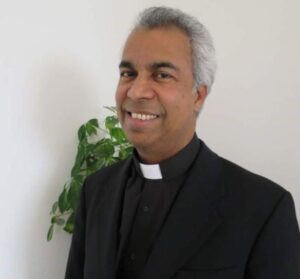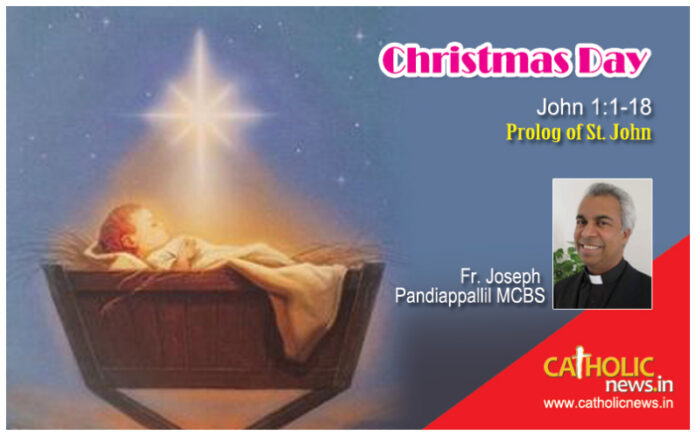Christmas Day, John 1:1-18

When we hear the Prologe of St John every Christmas Day we will be surprised to know, how near God is to each and every one of us.
God is near to us as word we speak, word we hear, word we experience and as word we keep. The Prolog of St. John is the good news of the New Testament.
“In the beginning was the Word, and the Word was with God, and the Word was God.”
The Gospel of Mathew narrates the geneology of Jesus in which Jesus is depicted as the son of David and as the son of Abraham through wich the kingly heredity of Jesus is confirmed. The Gospel of Luke reports about the shepherds, angels, lodge, birth of Jesus in a stable, heavenly melody and song etc. as the particularities by the birth of Jesus. The Prolog of John depicts Jesus as the Word and Glory of the only Son from the Father, full of truth and grace.
John the evangelist does not speak about the role of Mary as Mathew and Luke do to say that Jesus had an earthly mother and a heavenly Father. That means, in the Prolog of St John the holy Mary is not at all mentioned. Jesus as Word and Word as God are the themes in the incarnation according to the Prolog of St John.
This Word is presented at the same time as Light, Truth, Grace, Life and as Glory. We experience this Word as light and truth, as deed and action in the incarnation of God and in every unfolding of the Word. The incarnation of God as the incarnation of the Word expresses three levels in relation to three deeds of God.
First: the Prolog captures the Genesis, the creation story anew. In the creation story of the book of Genesis we read that God said and every thing was created. The Prolog of John repeats and cofirms the idea of creation through the Word of God namely through the Speech of God and brings to our attention the concept of creation through the Word.
Secondly, God spoke once again for a new creation in order to save the world which is in a way self -absorbed and went away from God. For that purpose the Word became flesh and dwelt among us. We have seen his glory, the glory of the one and only Son, who came from the Father, full of grace and truth.
Third: the Word of God as God himself, which became experienceable and tangible through creation and the new creation in Christ, wanted to be with us and to make his presence among us always noticeable. Therefore the incarnated Word of God spoke once again over bread and wine: “this is my body this is my blood”. The new and the eternal creation overcame the mortality of the first creation. This new creation that created everything will stay among us always and for ever as Word and flesh through different symbols and signs, and through the experience of the Word and experience of God in the hearts of the people.
One could think about the word, one could reflect it, consider it, keep the word, can be responsible for his word, can give his word or believe one‘s word. This word is light, truth and wisdom.
Word as God and the Word as human and the Word as Sacrament in the sign of bread and wine is not an abstract idea but a concrete reality that we can see, feel, and even eat and drink. God as word, God as Christ and God as Eucharist is near to as we ourselves are near to us, experienceable to us as we experience other individual, persons and things.
The prolog of St John proclaims this word to reveal the mystery of incarnation which we experience and proclaim on Christmas. Word made flesh has dwelt among us and is incarnating every day in our alter and in our hearts. Let us recognise him, experience him and proclaim him. He is the Lord! Halleluja!
Fr. Joseph Pandiappallil MCBS



